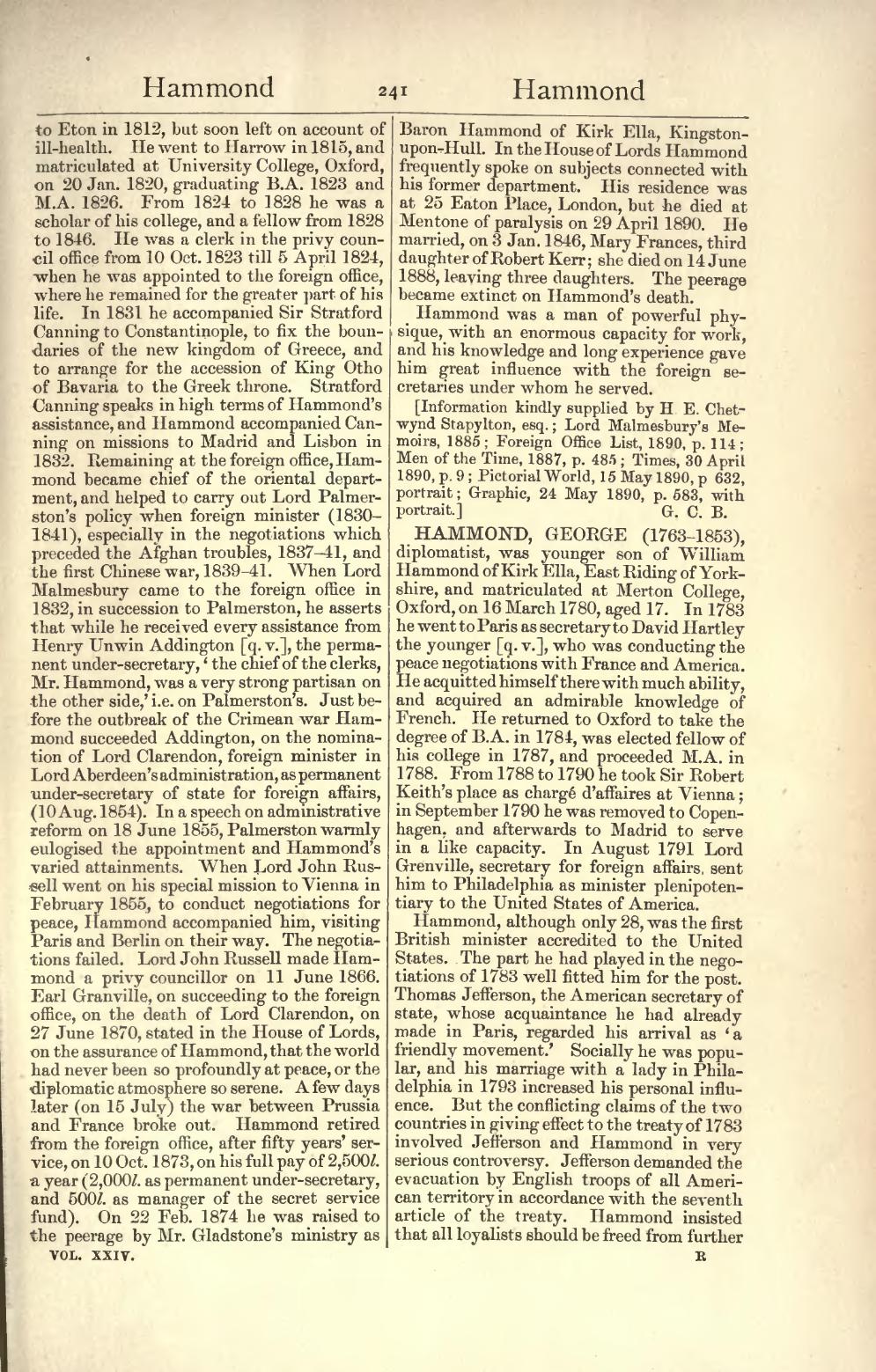to Eton in 1812, but soon left on account of ill-health. He went to Harrow in 1815, and matriculated at University College, Oxford, on 20 Jan. 1820, graduating B.A. 1823 and M.A. 1826. From 1824 to 3828 he was a scholar of his college, and a fellow from 1828 to 1846. He was a clerk in the privy council office from 10 Oct. 1823 till 5 April 1824, when he was appointed to the foreign office, where he remained for the greater part of his life. In 1831 he accompanied Sir Stratford Canning to Constantinople, to fix the boundaries of the new kingdom of Greece, and to arrange for the accession of King Otho of Bavaria to the Greek throne. Stratford Canning speaks in high terms of Hammond's assistance, and Hammond accompanied Canning on missions to Madrid and Lisbon in 1832. Remaining at the foreign office, Hammond became chief of the oriental department, and helped to carry out Lord Palmerston's policy when foreign minister (1830-1841), especially in the negotiations which preceded the Afghan troubles, 1837-41, and the first Chinese war, 1839-41. When Lord Malrnesbury came to the foreign office in 1832, in succession to Palmerston, he asserts that while he received every assistance from Henry Unwin Addington [q. v.], the permanent under-secretary, 'the chief of the clerks, Mr. Hammond, was a very strong partisan on the other side,' i.e. on Palmerston's. Just before the outbreak of the Crimean war Hammond succeeded Addington, on the nomination of Lord Clarendon, foreign minister in Lord Aberdeen's administration, as permanent under-secretary of state for foreign affairs, (10 Aug. 1854). In a speech on administrative reform on 18 June 1855, Palmerston warmly eulogised the appointment and Hammond's varied attainments. When Lord John Russell went on his special mission to Vienna in February 1855, to conduct negotiations for peace, Hammond accompanied him, visiting Paris and Berlin on their way. The negotiations failed. Lord John Russell made Hammond a privy councillor on 11 June 1866. Earl Granville, on succeeding to the foreign office, on the death of Lord Clarendon, on 27 June 1870, stated in the House of Lords, on the assurance of Hammond, that the world had never been so profoundly at peace, or the diplomatic atmosphere so serene. A few days later (on 15 July) the war between Prussia and France broke out. Hammond retired from the foreign office, after fifty years' service, on 10 Oct. 1873, on his full pay of 2,500l. a year (2,000l. as permanent under-secretary, and 500l. as manager of the secret service fund). On 22 Feb. 1874 he was raised to the peerage by Mr. Gladstone's ministry as Baron Hammond of Kirk Ella, Kingston-upon-Hull. In the House of Lords Hammond frequently spoke on subjects connected with his former department. His residence was at 25 Eaton Place, London, but he died at Mentone of paralysis on 29 April 1890. He married, on 3 Jan. 1846, Mary Frances, third daughter of Robert Kerr ; she died on 14 June 1888, leaving three daughters. The peerage became extinct on Hammond's death.
Hammond was a man of powerful physique, with an enormous capacity for work, and his knowledge and long experience gave him great influence with the foreign secretaries under whom he served.
[Information kindly supplied by H E. Chetwynd Stapylton, esq. ; Lord Malmesbury's Memoirs, 1885; Foreign Office List, 1890, p. 114; Men of the Time, 1887, p. 485 ; Times, 30 April 1890, p. 9 ; Pictorial World, 15 May 1890, p 632, portrait; Graphic, 24 May 1890, p. 583, with portrait.]
HAMMOND, GEORGE (1763–1853), diplomatist, was younger son of William Hammond of Kirk Ella, East Riding of Yorkshire, and matriculated at Merton College, Oxford, on 16 March 1780, aged 17. In 1783 he went to Paris as secretary to David Hartley the younger [q. v.], who was conducting the peace negotiations with France and America. He acquitted himself there with much ability, and acquired an admirable knowledge of French. He returned to Oxford to take the degree of B.A. in 1784, was elected fellow of his college in 1787, and proceeded M.A. in 1788. From 1788 to 1790 he took Sir Robert Keith's place as chargé d'affaires at Vienna; in September 1790 he was removed to Copenhagen, and afterwards to Madrid to serve in a like capacity. In August 1791 Lord Grenville, secretary for foreign aifairs, sent him to Philadelphia as minister plenipotentiary to the United States of America.
Hammond, although only 28, was the first British minister accredited to the United States. The part he had played in the negotiations of 1783 well fitted him for the post. Thomas Jeiferson, the American secretary of state, whose acquaintance he had already made in Paris, regarded his arrival as 'a friendly movement.' Socially he was popular, and his marriage with a lady in Philadelphia in 1793 increased his personal influence. But the conflicting claims of the two countries in giving effect to the treaty of 1783 involved Jefferson and Hammond in very serious controversy. Jefferson demanded the evacuation by English troops of all American territory in accordance with the seventh article of the treaty. Hammond insisted that all loyalists should be freed from further
